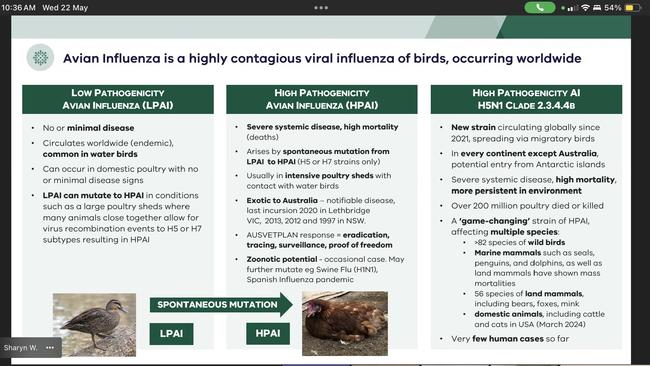Avian influenza hits second farm: Terang farm hit with new bird flu strain
A new strain of Avian influenza has been detected at a Terang poultry farm, which is an unrelated strain to the one detected at Meredith earlier this week. This is what we know.
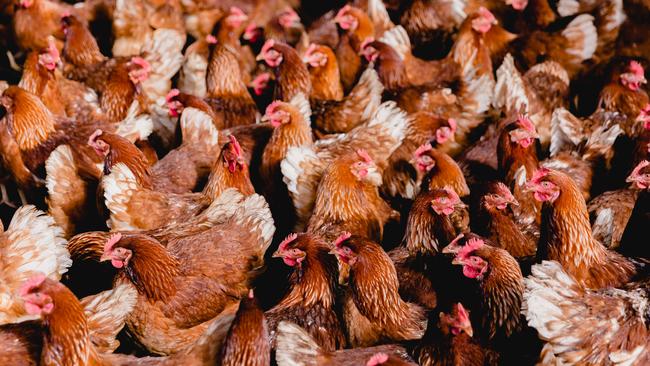
A new strain of Avian influenza has been detected at a Terang poultry farm – Surf Coast Eggs, which is an unrelated strain to the one detected at Meredith earlier this week.
Agriculture Victoria investigators initially assumed the Terang detection was linked to the Avgo’s Meredith farm outbreak of earlier this week, “through joint management, staff and machinery”
But avian veterinary experts say while the Meredith outbreak was a H7N3 subtype of Highly Pathogenic Avian Influenza (HPAI), the Terang strain is H7N9, which means it came from a different source.
Veterinary experts involved in the case say it’s clear the state is now dealing with outbreaks of differing viral subtypes, which most likely came from low pathogenic forms of avian influenza in wild birds that came in contact with the Meredith and Terang flocks.
Veterinarians also reported the Terang outbreak’s impact on hens was mild in comparison to the Meredith infection.
It appears Agriculture Victoria initially assumed a link between the properties, given they are both partners of the RAMP Advisory group, which also owns the Grampians Eggs business near St Arnaud that is free of the virus.
All properties linked to the outbreaks are being tested, with Agriculture Victoria tracking staff, egg and machinery movements between farms.
Australian Securities and Investments Commission records show RAMP Advisory chief executive officer Brad McAuliffe owns half the shares in the Meredith Avgo Sustainable Egg farm.
A Rebekah McAuliffe, also owns half the shares in the Terang Surf Coast Eggs, plus half the shares in a third business – Grampians Eggs – that leases sheds near St Arnaud.
An AVGO and Surf Coast Eggs spokesman said “we are working closely with Agriculture Victoria and complying with strict quarantine orders to handle the outbreak as safely as possible.
“As a family run, local business, we are devastated by the impact of the avian flu which has been discovered on two of our sites.
“We have procedures in place at our sites to protect biosecurity. Each of our two infected sites have been impacted by a different strain of the avian flu, which means there has been no cross contamination between our farms – just bad luck.
“Sadly, it is difficult to protect against avian flu but at such a difficult time, we can rest assured that we have been following all protocols and there is nothing we could have done to prevent this.
“It has been confirmed that the avian flu on our two sites have tested positive for are local strains that have been detected previously and are not new to Australia.”
Other business partners of RAMP Advisory include B&R Poultry Services, which contract-transports spent layers (old hens) and cleans out sheds, Synergy Poultry, macrospec and VAXA.
RAMP Advisory Chief Financial Officer Laz Lekakis said B&R Poultry was one of the largest service providers in the poultry industry.
“What is not an arguable point, but a fact is that we have in effect and apply one of the most stringent biosecurity standards, SOPs (standard operating procedures) and protocols in this game which makes us a preferred supplier to handle farmers’ service requirements,” Mr Lekakis said.
B&R Poultry also confirmed that all work and washdown crews were kept separate as part of its biosecurity protocols.
Agriculture Victoria testing has confirmed the outbreaks are not the H5N1 strain of avian influenza that is currently causing concern globally.
Victoria’s Chief Veterinarian Graeme Cooke said Agriculture Victoria staff were on-the-ground to support the impacted businesses and are continuing to work closely with industry to contain and eradicate the virus.
“We encourage the community to play their part so we can suppress and eliminate this outbreak,” he said.
“Poultry owners who reside within the restricted and control areas are asked to follow the restrictions and to report any unexplained bird deaths.”
Authorities have already notified the World Organisation of Animal Health, which will then notify Australia’s trading partners that two different strains of bird flu have been detected.
The Federal Department of Agriculture, Fisheries and Forestry has also placed a temporary suspension on health certification for all exports of poultry meat and egg products, from Friday May 24.
The impacts on exports is yet to assessed, but egg exports for 2023-24 are forecast to be worth about $8 million, while chicken meat exports are minimal.
However the impacts on exports of rendered poultry for animal feed and pet food may be far more extensive.
In past outbreaks all poultry within the restricted area have been culled, but at this stage Agriculture Victoria is focused on destroying the 400,000 birds on the Meredith.
But it remains unclear what is happening with the 175,000 birds on the Terang property, where the virus is having little impact.
Standard practice is to gas birds in bins containing 40 per cent carbon dioxide.
Avgo and Surf Coast Eggs will be compensated for the loss of birds and destruction of any equipment, but not for the consequent loss of income.
Quarantine zones have been put in place around both outbreaks.
The Meredith 5km restricted are covers another farm of several hundred thousand hens, which are being closely monitored.
A wider control area, shaded yellow on the Meredith map below, has also been put in place, which departmental veterinarians will monitor for the virus, with similar zones placed around the Terang farm.
A housing order has also been issued, requiring all poultry within the control zones to be put into cages or sheds to help minimise the spread of bthe bird flu.
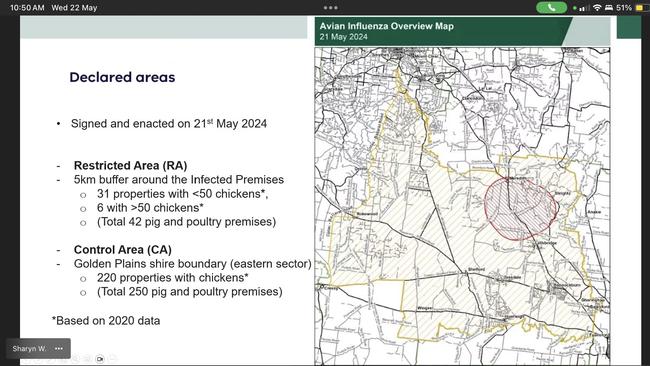
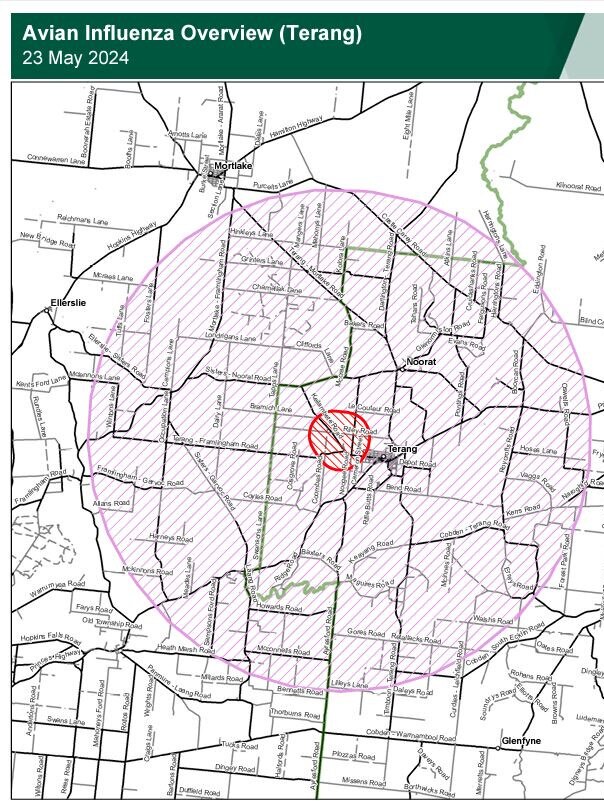
Industry leaders told The Weekly Times earlier this week they were first contacted by Agriculture Victoria on Monday with details of a suspected AI outbreak at Meredith, which was then confirmed the following day.
Poultry producers have been told the virus is not the highly pathogenic H5N1 avian influenza clade 2.3.4.4b that has swept the globe, killing 500 million birds and infecting at least 26 mammalian species.
The last time avian influenza outbreak to hit Victoria was in 2020, when six farms in three regions were infected, from 31 July and 25 August.
The Meredith outbreak sits within Victoria’s highest density poultry zone, where growers moved in 10 to 15 years ago at the urging of Golden Plains Shire Council.
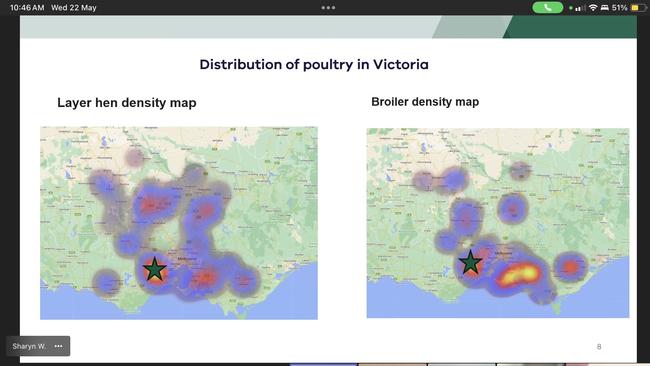
Agriculture Victoria has advised that while AI cases among humans in direct contact with animals infected with highly pathogenic avian influenza viruses is possible, the current risk to the public remains low.
“Every producer should have an on-farm biosecurity plan and know the signs of diseases that could affect their animals,” Agriculture Victoria said.
“All poultry and bird owners across Victoria are reminded to follow best biosecurity practices such keeping poultry sheds, yards, aviaries and equipment clean, and restricting contact between your poultry and wild birds.
“Bird owners should also ensure their footwear is clean, always wash hands before and after handling birds or eggs and quarantine new birds before integrating with existing ones.
“Consumers should not be concerned about eggs and poultry products from the supermarkets, they do not pose a risk and are safe to consume.”
SYMPTOMS IN BIRDS
Symptoms associated with avian influenza can include:
Sudden death
Respiratory signs (noisy or rapid breathing, coughing, sneezing, increased nasal secretions)
Conjunctivitis
Swelling of the head
Purple discolouration of the comb and wattles
Rapid decrease in feed and water intake
Decreased egg production
Ruffled feathers
Depression
Closed eyes
Diarrhoea
Nervous signs (twisted neck, inability to stay upright, inability to fly, uncoordinated movement, walking or swimming in circles, partial or full paralysis).
WHAT TYPE OF BIRD FLU IS THAT?
